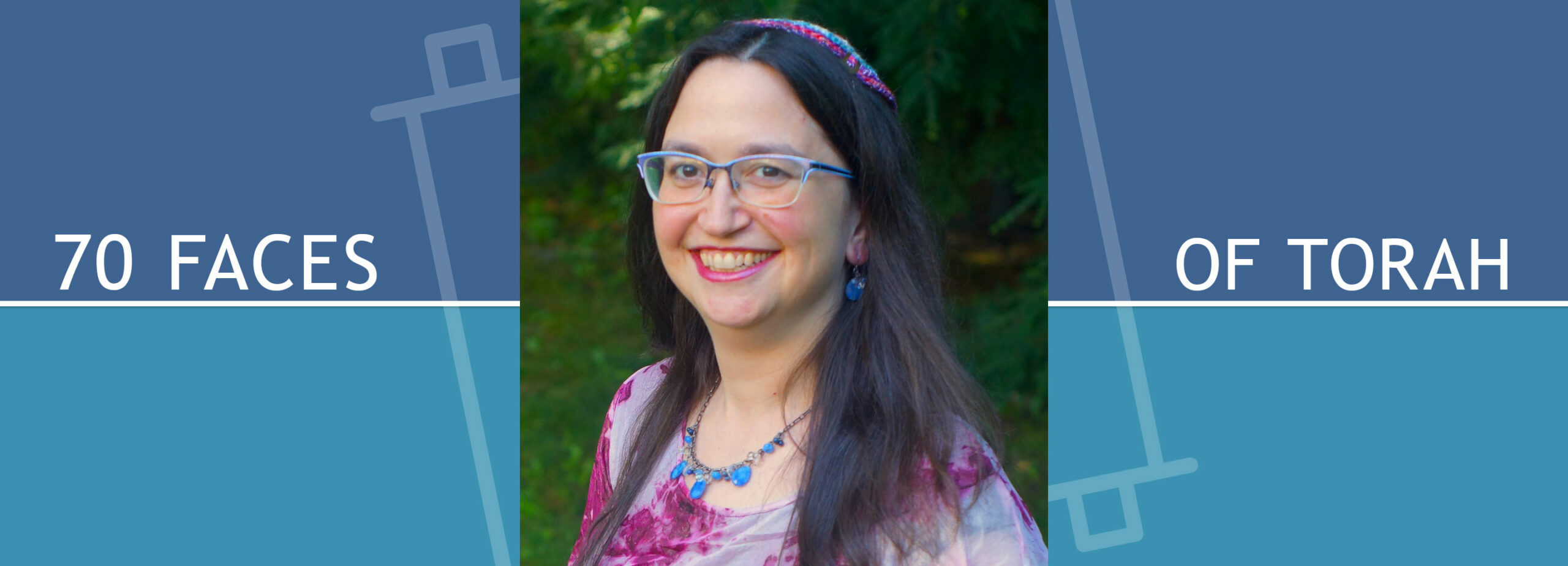Genesis What the Sigma, Jacob?

Parashat Vayetzei Genesis 28:10-32:3
Working with high school students, one of my pastimes has become learning the new ways kids these days use language. It makes me feel clever to be able to understand what they are saying, and occasionally to use one of my new vocabulary words, always ironically and intentionally to see the “cringe” they evoke. This year, as the students entering high school turn the corner from youngest of “gen-z” to the oldest of “gen-alpha”, things are suddenly all skibbidi and Ohio.
Much of this new generation’s slang strikes me as visceral metaphor. Someone or something that was really good or successful “ate” and maybe “left no crumbs.” When there’s trouble that seems unavoidable a person, a group, or maybe even the whole world can be “cooked.” When something is really awesome, it is “fire!” And, possibly most interesting to me, “sigma,” a term that comes from the imagined social hierarchy of wolves, can mean a lot of things depending on context, but is often a lone wolf, with positive connotations around confidently doing one’s own thing, with little concern for social hierarchy or the size of one’s following.
For a number of years now, throughout the memorable lifetimes of the fourteen-year-olds wielding this generation’s hungry-sounding unique vocabulary, the world has felt like it is on the brink of change; cataclysmic or revolutionary, environmental, technological or political. Yet the young people’s metaphors come from the most basic human needs: food, warmth, social structures.
This week’s Parashah, Vayetzei, finds Jacob, the young leader-to-be of the next generation of our patriarchs, on his way into the unknown—physically, socially, and spiritually. Jacob departs alone, running from his brother and leaving behind the home and spiritual legacy he had presumed he would inherit. Like our gen-alpha, Jacob is thrust into a changing world, in which he must move confidently forward despite losing his social footing.
A short way into his journey, Jacob encounters what is named here as simply “makom”, a place, because night is falling. He gathers some rocks for a pillow, lies down for his first night away from home, and dreams the famous dream of angels ascending and descending a ladder to heaven. When he wakes up, Jacob exclaims,
אָכֵן יֵשׁ ה’ בַּמָּקוֹם הַזֶּה וְאָנֹכִי לֹא יָדָעְתִּי
surely there is God in this place, and I did not know!” (28:16)
Why did Jacob, spiritual heir to the fledgling Jewish project, not know that God would be in this place? Is it simply that he is young, a simple tent-loving homebody who has never been away from his family camp? Is he worried that God has abandoned him after the trickery he pulled in the last parashah? Is he missing some essential understanding of how God works or some critical element of faith in the divine?
In the dream, God announces Godself as the God of Jacob’s father and grandfather, and promises to be with Jacob, protecting him on his journey, bringing him home safely to establish a family who will grow to be the blessing promised to Abraham and Isaac. In the morning, after marking the spot and renaming it beit-el, the house of God, Jacob swears a strange vow. (28:20-21) He says,
אִם־יִהְיֶה אֱלֹהִים עִמָּדִי וּשְׁמָרַנִי בַּדֶּרֶךְ הַזֶּה אֲשֶׁר אָנֹכִי הוֹלֵךְ וְנָתַן־לִי לֶחֶם לֶאֱכֹל וּבֶגֶד לִלְבֹּשׁ
וְשַׁבְתִּי בְשָׁלוֹם אֶל־בֵּית אָבִי וְהָיָה ה’ לִי לֵאלֹהִים
If God will be with me and protect me on this journey, and will give me food to eat and clothes to wear
and return me to my father’s house in peace, then God [Adonai] will be my God [Elohim].
So many things about this vow are strange (or perhaps “Ohio,” as the young folks would say). For one thing, God has just promised to do exactly what Jacob is asking. Does Jacob doubt God’s intention to follow through? Additionally, swearing a conditional vow that God will be his God seems like the epitome of chutzpah!
The classical commentators debate what Jacob could possibly mean by a vow like this, most trying to mitigate the chutzpah from our young hero. 16th-century commentator, Rabbi Ovadiah ben Jacob Sforno, reads the vow as saying not “God will be my God,” but “God will be a judge,” adding another layer of meaning to the name Elohim that Jacob uses at the end of the vow. In Sforno’s reading of these verses, because God is providing Jacob with the necessities of food, clothing and protection, Jacob is moved from a stance of needing God to relate to him as Adonai, God’s attribute of compassion, to a willingness to engage with God’s attribute of judgement, Elohim.
Sforno’s reading helps us understand how Jacob finds the courage to grow into not only a responsible adult, but the leader whose name will forever be associated with our people. It also helps us understand how, given his father and grandfather’s close relationship with the divine, he could have doubted that God would be in this place.
As Jacob sets out on his journey, he is alone and facing a world of change, a situation many of us can relate to. He worries about his basic needs—food, clothing, and safety—and longs for his lost sense of human connection and belonging. In this state, the only version of God he can hope for is the God of compassion, who will keep him alive and sustain him. The only version of himself he can imagine is the Jacob who keeps moving forward, figuring out how to get what he needs. The encounter with God provides the basis of security that Jacob needs. It allows him to expect more of himself, and to desire a relationship with a God who is both compassionate and just, a God who holds Jacob to a high standard while providing an underlying cushion of support.
When God promises Jacob that all the families of the earth will bless themselves through you and your descendents, perhaps it is this stance—of faith that God will provide the necessities and the sense of obligation to act accordingly in just and moral ways—that is the source of blessing.
I wonder if I am reading too much into the metaphoric meaning of the words gen-alpha uses to describe their successes and challenges. But the expressions about eating, cooking, crumbs, fire, and wolf hierarchies tug at my kishkes, my guts. They remind me of all the ways in which our society signals to the rising generation that the future is changing so rapidly that even the basic necessities feel uncertain.
As an “X-ennial”, I have memories from before the tech revolution, from a time when my peers and I thought the world had outgrown war, hate, and discrimination and was making strides towards eliminating poverty and disease. We watched the world change in ways we never imagined, over and over again. My generation has had to reckon with the late realization that even as human beings improve many things about our world, we also tear down many others. From this realization, we can either reverse course and focus on protecting ourselves, or we can take it upon ourselves to make the world a place our children can rely on to meet their basic needs and more.
It is chilling to imagine how this new cusp generation will construct their understanding of what the world has to offer. What kind of leaders will these “sigmas,” these confident, carefree lone wolves, grow up to be? In researching the term “sigma” I’ve learned that perhaps wolf packs don’t actually work the way the labels suggest. There may not really be an alpha who rules, betas who submit, and sigmas who thrive on the periphery. This may all be in our imagination and really the pack is a family.
While the generation of “sigmas” is still in their early teens, it is up to us to repaint the world as a place where they can meet their needs to “eat,” rather than worry about being “cooked,” and where “leaving crumbs” is not such a bad thing. Our legacy calls on us to build them a society to take care of them when they are sick or struggling, support them in pursuing knowledge and meaningful work, affirm them in the identities that they construct for themselves, and support them in pursuing moral, just, and honorable ways of living.
The words of Jacob’s vow, לֶחֶם לֶאֱכֹל וּבֶגֶד לִלְבֹּשׁ, food to eat and clothes to wear, transport me to a haunting Hasidic melaveh malkah zmirah, a song for the end of shabbos, which asks God to give each person what they need, appending to food and clothing, ויין קדוש להבדלה, and kiddush wine for havdalah. As the Hasidic song translates the basic needs through the generations, it recognizes the human need to have some capacity beyond the physical necessities, if only a little wine to bless God for keeping the world running as we’ve come to expect. Let us be satisfied with no less.
Rabbi Shira Shazeer received rabbinic ordination from the Rabbinical School of Hebrew College in 2010 and a Masters Degree in Jewish Education with a focus on special education in 2022. Previously, she studied Torah in the Scholars Circle at Drisha Institute for Jewish Learning and music at Goucher College. Rabbi Shazeer teaches in the learning center at Gann Academy. She is a Yiddish enthusiast, a singer, accordion player and occasional composer, and parent to three fabulous kids.
Meet students and faculty at our online fall open house, Ta Sh’ma (Come & Hear) on December 8. Learn more and register.
Explore Graduate Programs Tamid Adult Learning Classes Support Our Work


